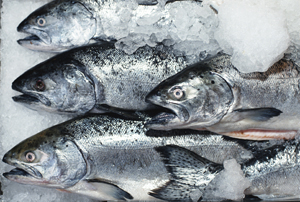
If the FDA approves the fish, it would mark the first time a genetically modified animal has been approved for America’s dinner plates and restaurant menus.
Massachusetts-based AquaBounty Technologies is producing a salmon in a contained fresh water culture facility that grows twice as fast as conventional salmon. The company takes a growth gene from Chinook salmon and a “promoter” gene from another fish called ocean pout to the promoter gene turns on the Chinook salmon growth gene, according to John Buchanan, AquaBounty’s director of research and development. The resulting salmon grow to market weight about twice as fast (18 months) as ordinary Atlantic salmon (36 months), although they do not get larger overall.
If the FDA approves the fish, it would mark the first time a genetically modified animal has been approved for America’s dinner plates and restaurant menus. The bulk of the genetically modified foods already on the market are soybeans, corn, canola, cottonseed oil and sugar beets. The U.S. leads the world in genetically modified (GM) foods because as much as 80 percent of prepared and prepackaged foods use GM ingredients.
On September 3, 2010, a scientific panel that advises the FDA paved the way for the approval of the genetically modified salmon, calling it “as safe as food from conventional Atlantic salmon.” The FDA’s Veterinary Medicine Advisory Committee said the fish contained the same amount of nutrients and had “no biologically relevant differences” from ordinary-farmed Atlantic salmon.
The FDA is regulating genetically engineered animals as it would a new veterinary drug, which means that much of the research and information about the product is being kept confidential.
There is an outcry from consumer advocates. “We do not know if it is safe for humans to eat, and the only research that has been done was done by the company,” said Wenonah Hauter, executive director of Food & Water Watch in Washington, D.C. “The FDA is an under-resourced agency that has had so much trouble with the regulatory system for foods — we have had tainted eggs, poisonous peanuts and other contaminations — and is now taking on something in a very nontransparent way.”
Food & Water Watch was joined by 30 other animal welfare, consumer, environmental and fisheries groups, including the Sierra Club, which issued a statement citing concerns that the fish could escape, posing an environmental threat. Consumer advocates have also warned that “transgenic fish” could introduce new or unknown allergens into the food supply.
Opponents are demanding that, if approved, the FDA will at least require transparent GM labeling. That would be a first — GM soy, corn, etc., are not labeled. A lot is at stake. If the GM salmon is approved, it will set a precedent for the approval of many other types of GM animals, including cows, pigs and chickens.
Sources: HealthDay News, September 22, 2010, www.businessweek.com/lifestyle/content/healthday/643433.html.
Reprinted from AzNetNews, Volume 29, Number 5, Oct/Nov 2010.





February 25, 2012
Environment, Food, Genetically modified, Health